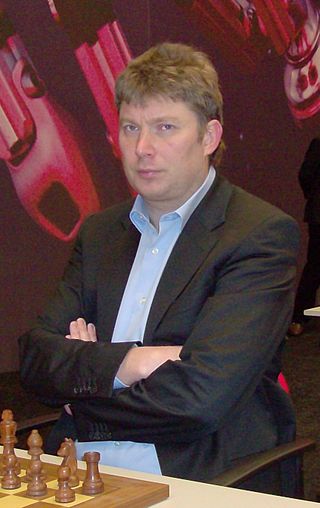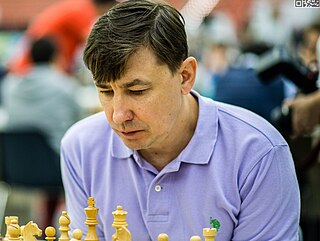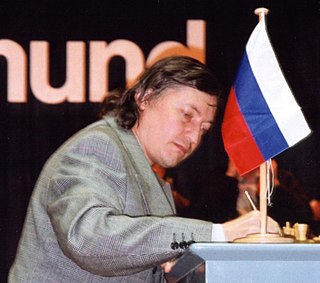Related Research Articles

Garry Kimovich Kasparov is a Russian chess grandmaster, former World Chess Champion (1985–2000), political activist and writer. His peak FIDE chess rating of 2851, achieved in 1999, was the highest recorded until being surpassed by Magnus Carlsen in 2013. From 1984 until his retirement from regular competitive chess in 2005, Kasparov was ranked world no. 1 for a record 255 months overall. Kasparov also holds records for the most consecutive professional tournament victories (15) and Chess Oscars (11).

Vladimir Borisovich Kramnik is a Russian chess grandmaster. He was the Classical World Chess Champion from 2000 to 2006, and the 14th undisputed World Chess Champion from 2006 to 2007.
Brains in Bahrain was an eight-game chess match between World Chess Champion Vladimir Kramnik and the computer program Deep Fritz 7, held in October 2002. The match ended in a tie 4-4, with two wins for each participant and four draws.

Yasser Seirawan is a Syrian-born American chess grandmaster and four-time United States champion. He won the World Junior Chess Championship in 1979. Seirawan is also a published chess author and commentator.

Raymond Dennis Keene is an English chess grandmaster, a FIDE International Arbiter, a chess organiser, and a journalist and author. He won the British Chess Championship in 1971 and was the first player from England to earn a Grandmaster norm, in 1974. In 1976, he became the second Englishman to be awarded the Grandmaster title, and he was the second British chess player to beat an incumbent World Chess Champion. He represented England in eight Chess Olympiads.

Veselin Aleksandrov Topalov is a Bulgarian chess grandmaster and former FIDE World Chess Champion.

Alexei Shirov is a Latvian and Spanish chess player. Shirov was ranked number two in the world in 1994.

Peter Leko is a Hungarian chess grandmaster and commentator. He became the world's youngest grandmaster in 1994. He narrowly missed winning the Classical World Chess Championship 2004: the match was drawn 7–7 and so Vladimir Kramnik retained the title. He also came fifth in the FIDE World Chess Championship 2005 and fourth in the World Chess Championship 2007.

Teimour Boris oghlu Radjabov is an Azerbaijani chess grandmaster.

Gata Kamsky is a Soviet-born American chess grandmaster, and a five-time U.S. champion.
Several methods have been suggested for comparing the greatest chess players in history. There is agreement on a statistical system to rate the strengths of current players, called the Elo system, but disagreement about methods used to compare players from different generations who never competed against each other

Joël Lautier is a French chess grandmaster and one of the world's leading chess players in the 1990s and early 2000s. In 1986, he won the U-14 World Youth Chess Championship in Puerto Rico, Argentina. In 1988, he won the World Junior Chess Championship, ahead of stars such as Vasily Ivanchuk, Boris Gelfand and Gregory Serper. He is the youngest player ever to win the World Junior Championship at the age of 15. He is one of the few players who has a lifetime positive score against Garry Kasparov. He was one of the people instrumental in Kramnik winning the Classical World Chess Championship 2000 against Kasparov by preparing the infamous 'Berlin Wall'. He also won the French Chess Championship twice in 2004 and 2005. He was the first president of the Association of Chess Professionals when it was founded in June 2003. In 2006, Lautier gave up competitive chess to pursue a career in investment banking. Since 2009 he has been CEO of the Moscow-based investment banking firm RGG Capital.

Evgeny Ilgizovich Bareev is a Russian-Canadian chess player, trainer, and writer. Awarded the FIDE Grandmaster title in 1989, he was ranked fourth in the world in the international rankings in 1992 and again in 2003, with an Elo rating of 2739.

The Classical World Chess Championship 2000, known at the time as the Braingames World Chess Championships, was held from 8 October 2000 – 4 November 2000 in London, United Kingdom. Garry Kasparov, the defending champion, played Vladimir Kramnik. The match was played in a best-of-16-games format, with Kramnik defeating the heavily favoured Kasparov. Kramnik won the match with two wins, 13 draws and no losses. To the supporters of the lineal world championship, Kramnik became the 14th world chess champion.

The Classical World Chess Championship 2004 was held from September 25, 2004, to October 18, 2004, in Brissago, Switzerland. Vladimir Kramnik, the defending champion, played Peter Leko, the challenger, in a fourteen-game match.

The FIDE World Chess Championship 1996 was a chess tournament held by FIDE to determine the World Chess Champion.
Events of 1999 in chess include the list of top chess players and news.
Below is a list of events in chess in 1995, as well as the top ten FIDE rated chess players of that year.
This article documents the progress of significant human–computer chess matches.
References
- ↑ "Who is Mig Greengard?", Chessbase, accessed January 05, 2007
- 1 2 "Archive for Mig Greengard - Editor of theotherrussia.org., The Other Russia, accessed January 05, 2007
- ↑ "A Conversation with Mig Greengard", Howard Goldowsky, ChessCafe.com
- ↑ "Mig talks to Kramnik", Chessbase, 16 December 2002
- ↑ "Man versus machine chess match drawn", Celeste Biever, New Scientist, 19 November 2003
- ↑ "Rage Against the (Chess) Machine", Leander Kahney, Wired, 10 November 2003
- ↑ "Braingames World Chess Championships", London Chess Centre, accessed 7 January 2007
- ↑ Troianovski, Anton (2007-10-20). "Kasparov's Political Gambit". The Washington Post . Cambridge. ISSN 0190-8286 . Retrieved 2022-02-20.
- ↑ "Kasparov in New York – and on Al Jazeera", Chessbase, 20 December 2007
- ↑ "Michael Greengard", IMDb, accessed 6 January 2008
- ↑ "Computer Chess: Looking Back, Looking Forward", Howard Goldowsky, ChessCafe.com, May 20, 2005
- ↑ "2007 Chess Journalists of America/Fred Cramer Awards Committee for Excellence in Chess Journalism" Archived 2007-09-28 at the Wayback Machine , Chess Journalists of America, 10 September 2007
- ↑ "Interview with Mig Greengard, United States Chess Federation, Jonathan Hilton, September 4, 2007